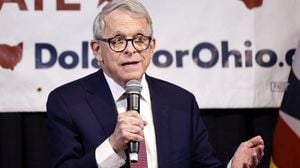Across the United States, political tensions are mounting as the 2024 election gears up to be one of the most pivotal contests in recent history. While candidates make their rounds rallying support, the current economic climate adds another layer of complexity. Inflation remains stubbornly high, yet some areas of the economy show signs of resilience, presenting both challenges and opportunities for voters and officials alike.
President Biden's administration is facing criticism over the handling of inflation and economic recovery. Inflation rates have fluctuated but are still high compared to pre-pandemic levels, which leaves many Americans feeling the pinch at the gas pump and grocery store. Despite this, Bidenomics aims to showcase growth through significant investments and job creation. According to recent reports, the number of jobs added to the economy has exceeded expectations, with sectors like healthcare, education, and renewable energy witnessing substantial growth.
But the story of the current economy is not all rosy. There’s concern among voters, primarily with rising housing costs and rent prices making homeownership feel out of reach for many. Economists note this may be affecting overall consumer confidence, which is closely watched by both parties heading toward the elections. Interestingly, some polling suggests voters may be balancing their budget concerns with support for Biden's social programs, viewing them as necessary to help struggling families.
On the opposition side, former President Donald Trump continues to be a polarizing figure within the Republican ranks. His influence is still strong, as he gears up for another run. Trump’s unchecked rhetoric appeals to his base but also frightens some moderate Republicans. Notably, several GOP candidates are either distancing themselves from Trump or trying to align with his ideologies, creating tensions within the party—and not just about policy. Each candidate’s stance on social issues like abortion, climate change, and healthcare could determine their appeal to various voter blocks.
One significant development within the GOP is the shifting positions of its candidates on healthcare. Many candidates are beginning to voice more progressive policies on mental health and healthcare accessibility, seeking to resonate with voters concerned about these issues. The latest polls indicate healthcare remains one of the biggest concerns for American families, especially among suburban women, who played a key role in electoral outcomes during the last election.
When itcomes to social issues, the GOP seems divided, especially on topics such as abortion rights. Uneasy during the aftermath of the Supreme Court's decision on Roe v. Wade, candidates are finding themselves at crossroads on how to address constituents’ differing views. The general sentiment within the party is supportive of establishing some restrictions, but candidates must weigh this against the backlash observed from constituents who favor more moderate standards.
Meanwhile, Democrats are rallying around protecting reproductive rights as they gear up for what could be difficult midterms, according to poll analyses. Activist groups align with various campaigns, pushing to mobilize voter turnout as seen during previous primaries. The stakes were raised recently when several states began introducing restrictive abortion legislations, prompting organized responses from women's rights groups nationwide.
Economic disparities enter the fray as Democrats continue advocating for legislation aimed at balancing the wealth gap exacerbated by the COVID-19 pandemic. Proposals seeking to tax the ultra-wealthy have gained traction, though critics argue such legislation could dissuade potential investors stifling overall economic growth.
Also, as part of Biden’s focus on the economy, this fall, another core issue has arisen: climate change and sustainable development. The Democrats embrace policies intending to shift the U.S. away from fossil fuels and embrace renewable energy sources, aiming to attract environmentally conscious voters. Contrast this with Republicans, many of whom remain skeptical about such aggressive measures, concerned over their impact on jobs within traditional energy sectors.
Foreign policy also looms large as voters prep for the 2024 contest. The Biden administration's handling of international relations, particularly concerning China and Ukraine, has spurred debates among candidates who must address the delicate balance between national security and domestic concerns. Economic sanctions against Russia, following its invasion of Ukraine, and worrying economic signals from China are both likely to be brought up during presidential debates.
Overall, as the candidates traverse the tighter-than-ever political climate leading to 2024, their platforms will have to resonate with voters over multiple pressing issues. The balance of managing domestic economic concerns, addressing social justice, reeling from the pandemic aftermath, and ensuring efficient governance will be imperative for candidates vying for American hearts and votes.
While the political climate is undoubtedly charged, the potential for change is at the door. Many Americans are eager for new, effective leadership—putting pressure on candidates to deliver credible visions for the future. The upcoming months promise to provide clarity as voters prepare to make choices deeply impacting the country's direction.
Stay informed and engaged as the gearing up for the 2024 elections showcases American democracy amid economic fluctuation, cultural shifts, and political ideologies battling for the future.



